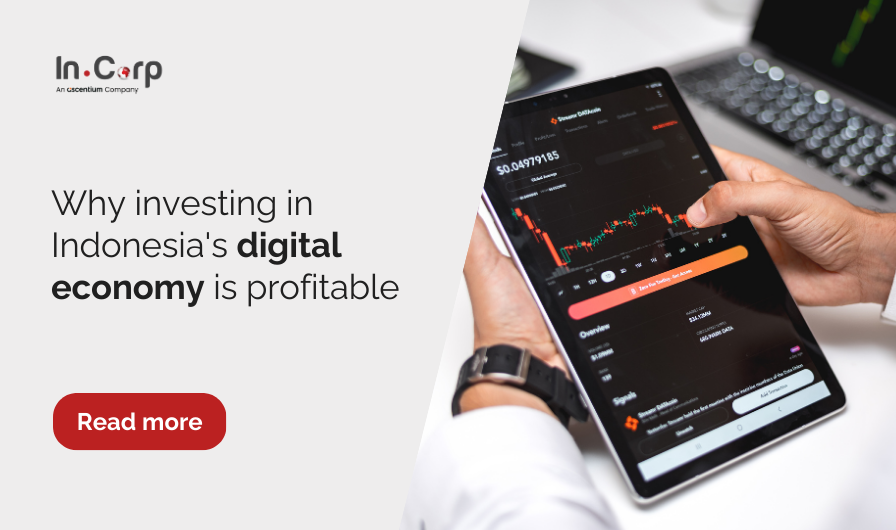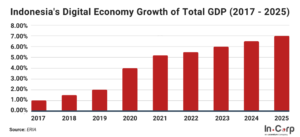Indonesia is rapidly changing due to digital technology. Its digital economy is growing quickly and thriving, and the digital industry offers rich investment opportunities.
We will delve into Indonesia’s digital economy’s key aspects, growth drivers, challenges, and opportunities for investors and businesses.
What is the digital economy?
The digital economy is an ecosystem of economic activities driven by digital technologies. It includes e-commerce, digital payment systems, online services, and platforms aimed at fostering growth, connectivity, and efficiency.
This sector’s key point is its reliance on data, connectivity, and seamless digital interaction, which serves as the backbone of modern innovation.
Indonesia has emerged as a rising star in Southeast Asia’s digital economy sector. With its large tech-savvy demographic, the nation is ready to harness digitalization’s growing potential.
How digital economy drives growth in Southeast Asia
Southeast Asia has emerged as a global hotspot for digital economic growth, driven by rapid technological adoption and increasing connectivity. Several key factors fueling digital transformation in the region, including:
Rising Internet Consumption
The increasing affordability of smartphones, coupled with enhanced internet access, has enabled connectivity for millions of individuals via various online platforms.
E-Commerce Expansion
Shopee and Lazada have transformed retail by facilitating cross-border trade and connecting consumers and sellers through digital marketplaces.
Digital Payment Systems
Fintech innovations like e-wallets are transforming financial transactions by replacing cash payments and enhancing financial inclusion.
Read more: Digital Financial Innovation in Indonesia.
Insights on Indonesia’s digital economy growth
Indonesia is the most prominent digital economy among ASEAN nations, accounting for 42% of the region’s market share. Since 2017, the sector has grown by an impressive 414%, attracting $9.1 billion in digital investments in 2021.
This rapid growth will continue, with estimates showing a 62% increase by 2025. This means an eightfold increase in less than 10 years. The significant growth is driven by market dynamics alongside strategic initiatives from both government and private sector stakeholders.
Fast-growing internet penetration and a large youth population have fueled the sector’s expansion. To sustain this growth, key initiatives have been introduced, including investments in digital infrastructure, startup funding, and business-friendly policies to attract investors.
Why invest in Indonesia’s digital economy
With steady growth, Indonesia is on its way to becoming a global leader in the digital economy. Key sectors like e-commerce, fintech, edtech, and health tech offer promising opportunities for foreign investors entering the market.
Here is why you should consider investing in Indonesia’s digital economy industry:
1. Rising foreign investment and growth
Indonesia secured $9.1 billion in digital investments in 2021, with projections reaching $130 billion by 2025. This rapid growth reflects strong global confidence, attracting investors seeking high-growth opportunities.
2. Massive consumer market
With over 200 million internet users, Indonesia has one of the largest online consumer bases in the world. The increasing demand for e-commerce, fintech, and digital services creates endless business opportunities.
3. Government policies
Policies like ‘Making Indonesia 4.0’ accelerate digital transformation across industries, ensuring long-term growth potential.
4. Untapped potential markets
While Jakarta leads digital adoption, many rural and semi-urban areas remain underserved. This presents a significant opportunity for businesses to expand and capture new customer segments.
Read more: Exploring investment potential in Indonesia.
Challenges in Indonesia’s digital economy
Despite its rapid growth, Indonesia digital economy faces several challenges. From regulations to infrastructure gaps, businesses must navigate these obstacles to succeed:
- Regulatory Complexity: Strict laws on data protection, foreign ownership, and e-commerce taxes require businesses to stay updated and compliant.
- Infrastructure Gaps: Many rural areas lack stable internet connections, making it harder for businesses to reach untapped markets.
- Cybersecurity Risks: The rise in digital transactions increases threats like hacking and fraud, requiring strong data protection strategies.
- Talent Shortages: A limited number of skilled tech professionals in AI, fintech, and cybersecurity slows innovation and business growth.
To address these challenges, businesses must work with reliable local partners to navigate complex regulations and strengthen cyber security to protect data. Successfully tackling these obstacles will allow investors to maximize Indonesia’s digital economy potential.
Simplify your digital business journey in Indonesia
Entering Indonesia’s booming digital market requires a clear understanding of local regulations to ensure compliance. At InCorp Indonesia (An Ascentium Company), our experienced consultants offer clear guidance on Indonesia’s laws and market conditions. We provide comprehensive services to meet all your needs.
- Company Registration in Indonesia: Get professional assistance in setting up your business, from legal structuring to regulatory compliance.
- Business License in Indonesia: Secure the proper permits and approvals to operate legally and hassle-free in Indonesia’s fast-growing digital economy.
Fill out the form below and unlock the vast opportunities in Indonesia’s thriving digital economy.
Get in touch with us.
What you'll get
A prompt response to your inquiry
Knowledge for doing business from local experts
Ongoing support for your business
Disclaimer
The information is provided by PT. Cekindo Business International (“InCorp Indonesia/ we”) for general purpose only and we make no representations or warranties of any kind.
We do not act as an authorized government or non-government provider for official documents and services, which is issued by the Government of the Republic of Indonesia or its appointed officials. We do not promote any official government document or services of the Government of the Republic of Indonesia, including but not limited to, business identifiers, health and welfare assistance programs and benefits, unclaimed tax rebate, electronic travel visa and authorization, passports in this website.




